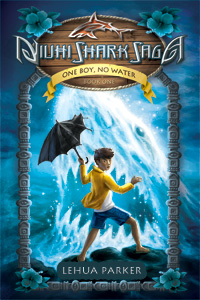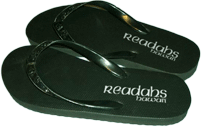 Just released in time for fall reading and holiday gifting, One Boy, No Water (Jolly Fish Press, 2012) is the first book in the “Niuhi Shark Saga” by Lehua Parker. It centers around a boy named Zader and his hanai (adopted) family. Uncle Kahana found Zader when he was just a new born baby, near a sacred rock on a special section of beach and even though he was raised like an ordinary member of the family, Zader is nothing but extraordinary.
Just released in time for fall reading and holiday gifting, One Boy, No Water (Jolly Fish Press, 2012) is the first book in the “Niuhi Shark Saga” by Lehua Parker. It centers around a boy named Zader and his hanai (adopted) family. Uncle Kahana found Zader when he was just a new born baby, near a sacred rock on a special section of beach and even though he was raised like an ordinary member of the family, Zader is nothing but extraordinary.
Water causes Zader’s skin to bubble and break out, so he has to be careful to not get wet. He carries an umbrella everywhere and can’t play or swim like his brother or his friends. This uncommon “allergy” to water is a focus for school bullies who often pick fights with Zader and his brother Jay, threatening their chances at getting into a better school next year. Then a shark encounter stops Jay from surfing despite his natural talent for the sport and an upcoming competition. On top of all this, Zader keeps having mysterious dreams about a girl he meets at the sacred rock where he was found as a baby. But it’s his big heart and concern for his family above himself, as well as his uncanny artistic ability, that proves an asset in rising above bullying and gaining confidence in himself.
This first book spends a great deal of time introducing you to the main characters and developing little subplots. When we finally do learn a little bit about the main conflict arc at the end, it feels a bit rushed. One Boy, No Water is really the beginning of Zader’s coming of age and hopefully in the second book we’ll learn a little more about Zader’s niuhi shark family.
This is an advanced middle grade novel, not quite YA, but still enjoyable for all ages 10 and up. Zader’s struggle with school and bullies is something most kids can relate to. His alienation from his peers and even sometimes his family—simultaneously feeling like he doesn’t fit in but wanting to embrace his individuality—are all easy to identify with as well. Overall, One Boy, No Water is a colorful island tale and a modern take on various aspects of Hawaiian legend. There are a few places where the use of pidgin feels forced. Parker’s eagerness to include local sayings is obvious and for the most part is done very well.
Lehua Parker has written a lovely book for an age group often ignored. Middle grade books are some of the hardest to write and there are so few of them that include Hawaii(an )perspectives. I’m eagerly looking forward to reading the next installment!




